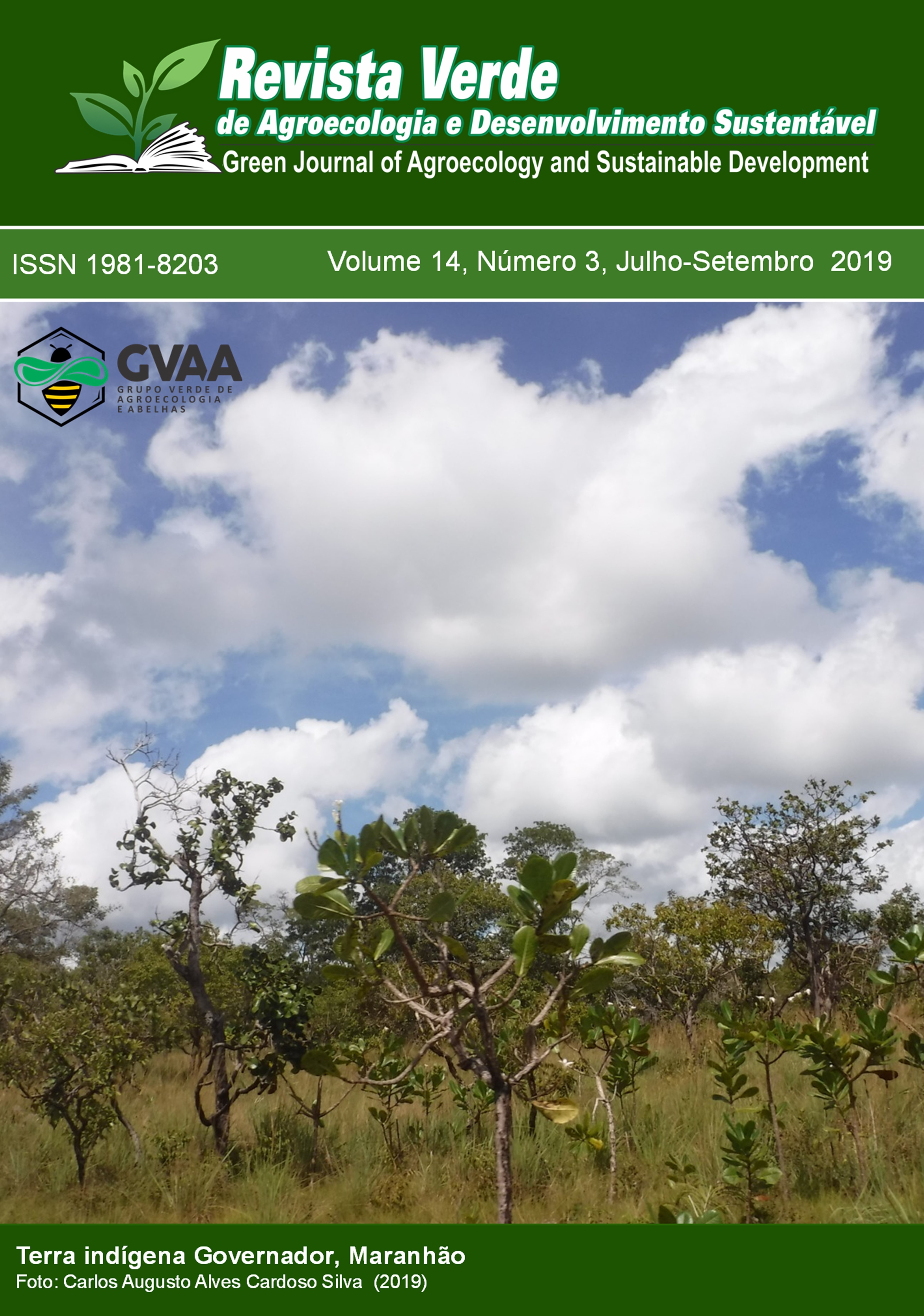Maintenance of Apis mellifera colonies in the period of food scarcity
DOI:
https://doi.org/10.18378/rvads.v14i3.6486Keywords:
Beekeeping, Artificial feeding, Colony conservation.Abstract
The aim of this research was to evaluate colony maintenance of Africanized bees (Apis mellifera L.), artificially fed in off-season. Twenty-two Africanized bee colonies housed in Langstroth hives were used and fed weekly on individual feeders with energetic (syrup) and protein (slurry ration) feed. The energy feed was composed of sugar and water at a concentration of 1:1. For protein feeding, three diets were formulated: treatment 2 (5.8% soybean, 11.8% wheat and 11.8% corn); treatment 3 (9.8% soybean, 9.8% wheat and 9.8% corn); and treatment 4 (14.7% soybean, 7.35% wheat and 7.35% corn) and beebread was used as a control treatment. The colonies were reviewed fortnightly. Was rated feed intake and the development of colonies by comb brood. It was found that there was no abandonment swarm during the experiment period. Control and treatment 2 were the most consumed diets, with the control treatment (beebread) showing a statistically significant difference from treatment 3 and treatment 4, and did not differ statistically from treatment 2. Treatment 3 and treatment 4 had the highest amounts of soy in the composition. It was verified that there was no statistically significant difference in the average of comb brood between the treatments. Artificial feeding in the off-season provides maintenance of Apis mellifera bee colonies.Downloads
References
APAC, AGÊNCIA PERNAMBUCANA DE ÁGUAS E CLIMA. Meteorologia. Disponível em: <http://www.apac.pe.gov.br/meteorologia/estacoes-do-ano.php> Acesso em 24 julho 2019.
ANDRIGUETTO, J. M. Nutrição animal: alimentação animal. São Paulo, Nobel, v. 2, 2002.
BRODSCHNEIDER, R.; CRAILSHEIM, K. Nutrition and health in honey bees. Apidologie, v.41, p.278–294, 2010. 10.1051/apido/2010012
COELHO, M. S.; SILVA, J. H. V.; OLIVEIRA, E. R. A.; ARAÚJO, J. A.; LIMA, M. R. Alimentos convencionais e alternativos para abelhas. Revista Caatinga, v.21, n.1, p.01-09, 2008.
DETMANN, E.; SOUZA, M. A.; VALADARES FILHO, S. C. Métodos para análise de alimentos - INCT - Ciência Animal. Visconde do Rio Branco: Suprema, 2012. 214p.
DI PASQUALE, G.; SALIGNON, M.; LE CONTE, Y.; BELZUNCES, L. O.; DECOURTYE, A.; KRETZSCHMAR, A.; SUCHAIL, S.; BRUNET, J.L.; ALAUX, C. Influence of Pollen Nutrition on Honey Bee Health: Do Pollen Quality and Diversity Matter?. PlosOne, v.8, n.8, p. 1-13, 2013. 10.1371/journal.pone.0072016.
DIAS, J. M. V. A.; MORAIS, M. M.; FRANCOY, T. M.; PEREIRA, R. A.; TURCATTO, A. P.; DE JONG, D. Fermentation of a pollen substitute diet with beebread microorganisms increases diet consumption and hemolymph protein levels of honey bees (Hymenoptera, Apidae). Sociobiology, v.65, n.4, p.760-765, 2018. 10.13102/sociobiology.v65i4.3293
DOMINGOS, H. G. T.; SOMBRA, D. S.; SANTOS, R. G.; GRAMACHO, K. P.; GONÇALVES, L. S. Surface temperature and heat transfer between body regions of africanized honeybees (Apis mellifera L.) in hives under sun and shade conditions in the Northeastern Semi-arid Region of Brazil. Journal of Agricultural Science and Technology, v.8, p.28-35, 2018. 10.17265/2161-6256/2018.01.004
GOMES, R. V. R. S.; MIRANDA, M. E.; GOMES, E. N.; SOMBRA, D. S.; SILVA, J. B. A. Produção e qualidade de mel na zona da mata de Pernambuco. Enciclopédia Bioesfera, v.14, n.26, p.540-549, 2017. doi: 10.18677/EnciBio_2017B52.
GONÇALVES, L. S.; DE JONG, D.; GRAMACHO, K. P. A expansão da apicultura e da tecnologia apícola no Nordeste brasileiro com especial destaque para o Rio Grande do Norte. Mensagem Doce, v. 3, p. 7-15, 2010.
LI, C.; XU, B.; WANG, Y.; FENG, Q.; YANG, W. Effects of dietary crude protein levels on development, antioxidant status, and total midgut protease activity of honey bee (Apis mellifera ligustica). Apidologie, v. 43, n. 5, p. 576-586, 2012. 10.1007/s13592-012-0126-0.
LIMA, M. V.; SOARES, K. O.; EVANGELISTA-RODRIGUES, A. Complexo enzimático na alimentação artificial de abelhas africanizadas. Arch. Zootec. v.66, n.255, p.415-420, 2017.
MODRO, A. F. H.; MESSAGE, D.; LUZ, C. F. P.; MEIRA NETO, J. A. A. Composição e qualidade de pólen apícola coletado em Minas Gerais. Pesq. Agropec. Bras., v.42, n.8, p.1057-1065, 2007. 10.1590/S0100-204X2007000800001.
MORAIS, M. M.; TURCATTO, A. P.; FRANCOY, T. M.; GONÇALVES, L. S.; CAPPELARI, F. A.; DE JONG, D. Evaluation of inexpensive pollen substitute diets through quantification of haemolymph proteins. Journal of Apicultural Research, v.52, n.3, p.119-121, 2013. 10.3896/IBRA.1.52.3.01.
OLIVEIRA, J. W. S. Efeito da suplementação proteica sobre características morfométricas de rainhas de abelhas africanizadas (Apis mellifera L.). 2016. 39f. Dissertação (Mestrado em Zootecnia) Universidade Federal de Sergipe, São Cristovão, 2016.
PEGORARO, A.; NUNES, F. L.; PEREIRA, F. F.; TEIXEIRA, R. A.; KRUGER, E.; SERMANN, K. C. Perdas de colônias de Apis mellifera L. no inverno suplementadas com alimentação artificial com pólen e favos de mel. Revista Agrarian, v.6, n.19, p.67-74, 2013.
PEREIRA, D. S.; HERNÁNDEZ, M. L.; ANDRADE, A. B. A.; SOUSA, J. S.; MARACAJÁ, P. B. Alimentação de abelhas Apis mellifera L. (Africanizadas) no período de estiagem, no Semiárido Nordestino, Brasil. Revista Verde de Agroecologia e Desenvolvimento Sustentável, v.9, n.5, p. 117-119, 2014. 10.18378/rvads.v9i5.3421
PEREIRA, F. M.; FREITAS, B. M.; VIEIRA NETO, J. M.; LOPES, M. T. R.; BARBOSA, A. L.; CAMARGO, R. C. R.; RIBEIRO, V. Q.; ROCHA, R. S. Efeito tóxico de alimentos alternativos para abelhas Apis mellifera. Ciência Rural, v.37, n.2, p.533-538, 2007.
R CORE TEAM R A language and environment for statistical computing. R Foundation for Statistical Computing, Vienna, Austria. 2018. Disponível em: <https://www.R-project.org/>. Acesso em 24 julho 2019.
SANTOS, R. G.; DOMINGOS, H. G. T.; GRAMACHO, K. P.; GONÇALVES, L. S. Sombreamento de colmeias de abelhas africanizadas no Semiárido Brasileiro. Revista Verde de Agroecologia e Desenvolvimento Sustentável, v.12, n. 5, 2017. 10.18378/rvads.v12i5.5407.
STANDIFER, L. N.; MOELLER, F. E.; KAUFFELD, N. M.; HERBERT JR., E. W.; SHIMANUKI, H. Supplemental feeding of honey bee colonies. United States Departament of Agriculture. Agriculture Information Bulletin, n. 413, p. 1-8, 1977.
VIDAL, M. F. Efeitos da seca de 2012 sobre a apicultura nordestina. Informe Rural Etene, ano 7, n.2, p.1–5, 2013.
VIDAL, M. F. Desempenho da apicultura Nordestina em anos de estiagem. Caderno Setorial Etene, ano 2, n.11, p.2–10, 2017.











